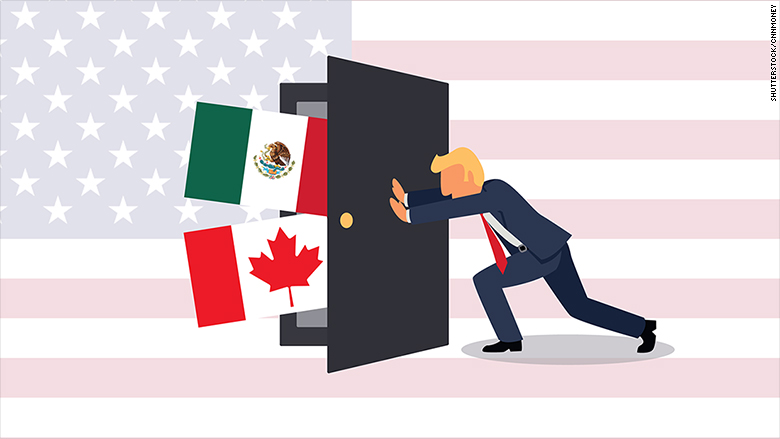
In the North American Free Trade Agreement renegotiations, the Mexican government is insisting on the best outcomes for the general population while paying special attention to workers. But a profound North American discomfort with NAFTA has emerged, which complicates reaching that goal. For President Donald Trump, the growing deficit that his country faces in its economic relations with Mexico has become his obsession and only point of reference.
That is what has sparked the current acidic confrontation between the two countries, which is encouraged by the indisputable repugnance felt by their president toward us Mexicans for reasons of race.
More important than the above-mentioned issue are the basic discrepancies between the visions of the current U.S. president and the Mexican government about how to develop a country. Trump is wedded to a crude concept of free enterprise, whenever it coincides with his personal experience in the management of his own businesses, and, incidentally, equally for resolving the problems of the most powerful government on earth. The path to world hegemony is a simple extension of what he has used to dominate his personal business environment. The rejection of Mexico is complete, and the clash over NAFTA inevitable. Trump’s proposals are unacceptable, and in that context, the survival of the treaty is caught in the middle.
The fact that Mexico has not proposed renegotiating or ending the agreement gives this country an advantage, since even while there are proposals for improvements that could be included, we can continue to use NAFTA in its current version. The urgency is not ours. Even with Trump’s denunciation, there is still a period in which the treaty can be used.
But there are political situations that ensure that decisions cannot wait too long. President Trump is receiving his worst popular ratings, hounded on all sides by the enemies that he makes for himself on a daily basis; his situation is dire. Complications accumulate around him these days, some as personal as his peculiar relations with women — of which more than enough has been revealed — others arise from his continuing to work with his businesses while he attempts to function as chief of the most powerful country on the planet.
Add to that the formal investigations into the Kremlin’s interference in the elections that sent Trump to the White House. Elections at the end of this year could end the Republican majority that defends him in the House of Representatives. At the moment, a weakened Trump is doubted by all and in every way.
Trump needs to undo the gigantic and dangerous puzzle that he himself created. Ironically, saving NAFTA would help him. Industry would back him and the banking sector would devote itself to explaining to the workers who support him the benefits of another term.
The political calendars in both countries are short enough. In Mexico, the presidential elections in early June are sufficient to cause speculation about what will happen if López Obrador wins and fulfills his promise to end NAFTA. There are those who want to provoke that danger by pushing to have the signature on the treaty text steamed away.
NAFTA is criticized for ending diversity in our export business, condemning us to being dominated by our North American customers. The easy response is that other treaties and alliances have been signed, but are not being taken advantage of.
Taking the whole picture into consideration, one can conclude that Mexico’s development is better assured with NAFTA than without it. To make changes, it would be necessary to keep the lower tariffs that have already been consolidated intact, and the system for addressing disputes in place, along with the rules of origin in automobile manufacturing.
We do not have to be frightened over the prospect of losing NAFTA. It could be beneficial. It would shake us out of the entrepreneurial drowsiness in which we find ourselves and diversify our exports.
The next round of negotiations is scheduled from April 23 to May 4. What we should do is stay firm on the core principles of our own interest, continue to play our cards well, and, simultaneously, do what is necessary to strengthen economic and judicial structures so that Mexico increasingly contributes to its own peace and prosperity and that of the world.

Leave a Reply
You must be logged in to post a comment.